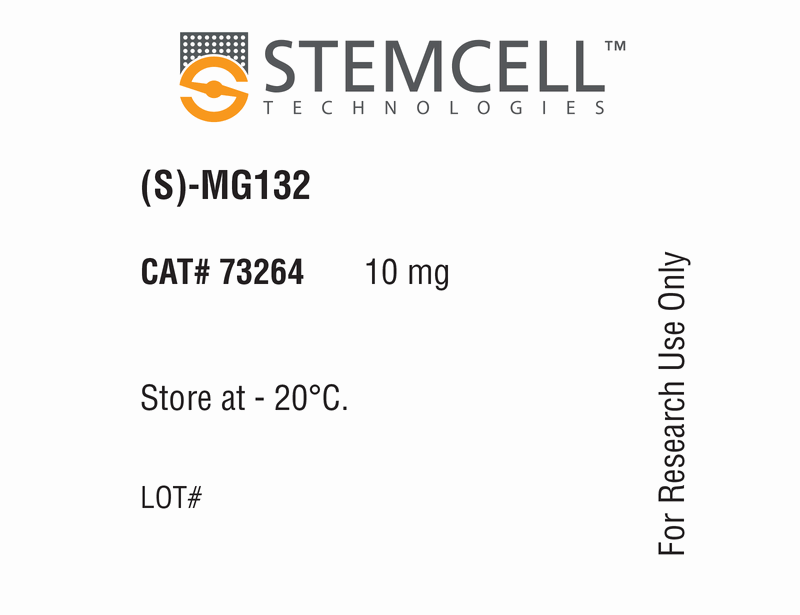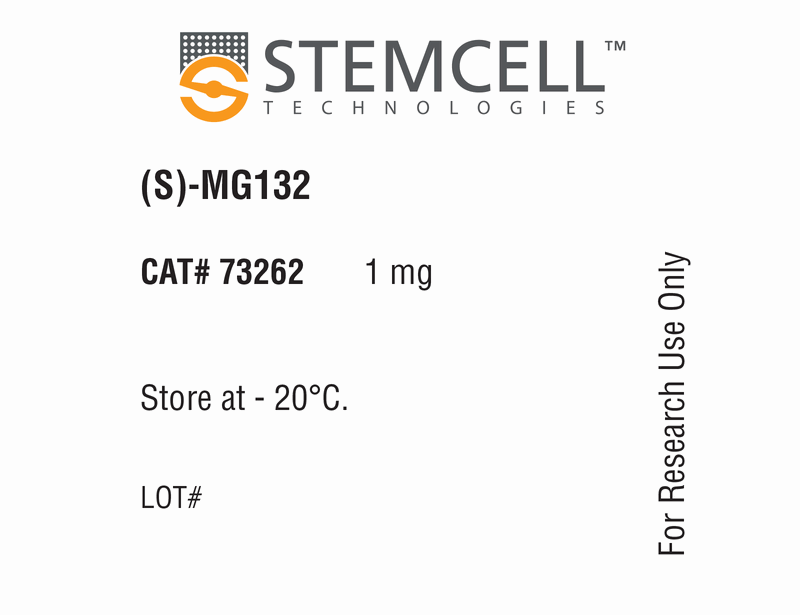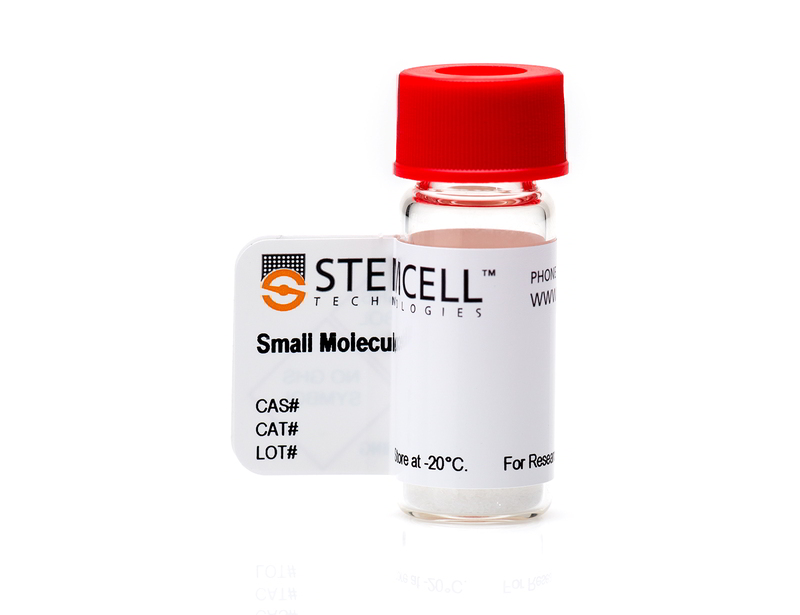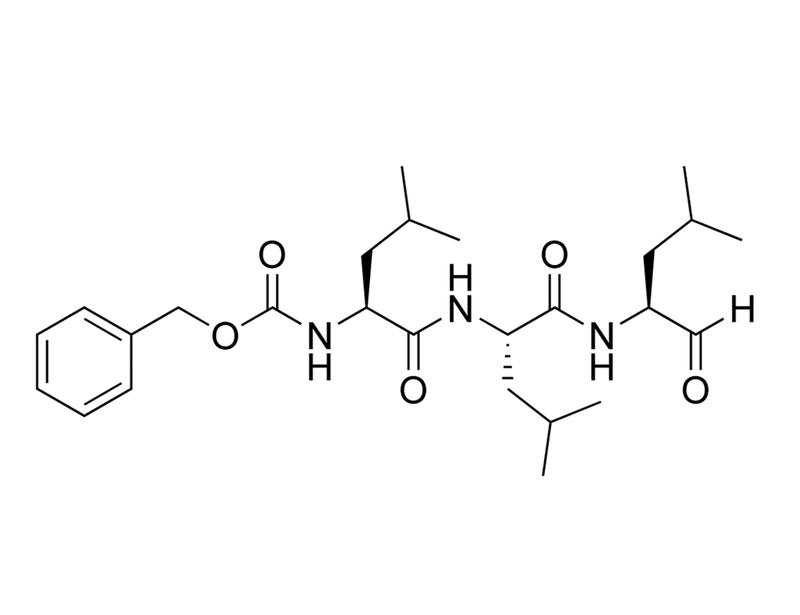概要
(S)-MG132 is a reversible, cell-permeable inhibitor of proteasome activity (IC₅₀ = 100 nM; Kisselev & Goldberg) and calpain (IC₅₀ = 1.2 µM; Tsubuki et al.). The ubiquitin-proteasome pathway selectively degrades intracellular proteins, thereby clearing damaged or misfolded proteins, and regulating the availability of key proteins involved in the control of inflammatory processes and cell cycle regulation. (S)-MG132 suppresses NF-κB activation by preventing IκB degradation (IC₅₀ = 3 µM; Arlt et al., Palombella et al., Ortiz-Lazareno et al.).
CANCER RESEARCH
· Blocks apoptosis triggered by DNA damage in HeLa cells (Zhang et al.).
· Inhibits NF-κB activation, sensitizing a variety of carcinoma cell lines to apoptosis (Arlt et al.).
· Cytotoxic effects on a variety of human cancer cell lines (Banerjee & Liefshitz).
· Inhibits growth of mouse melanoma (B16) and human ocular melanoma (IPC227F) cell lines (Vivier et al.).
CANCER RESEARCH
· Blocks apoptosis triggered by DNA damage in HeLa cells (Zhang et al.).
· Inhibits NF-κB activation, sensitizing a variety of carcinoma cell lines to apoptosis (Arlt et al.).
· Cytotoxic effects on a variety of human cancer cell lines (Banerjee & Liefshitz).
· Inhibits growth of mouse melanoma (B16) and human ocular melanoma (IPC227F) cell lines (Vivier et al.).
技术资料
| Document Type | 产品名称 | Catalog # | Lot # | 语言 |
|---|---|---|---|---|
| Product Information Sheet | (S)-MG132 | 73262, 73264 | All | English |
| Safety Data Sheet | (S)-MG132 | 73262, 73264 | All | English |
数据及文献
Publications (8)
Cell cycle (Georgetown, Tex.) 2011
MG132 inhibition of proteasome blocks apoptosis induced by severe DNA damage.
Abstract
Abstract
The 26S proteasome, a multicatalytic enzyme complex, is the main intracellular proteolytic system involved in the degradation of ubiquitinated proteins. The ability of proteasome inhibitors to induce apoptosis has been exploited in the recent development of chemotherapeutic agents. Here, we show that inhibition of proteasome by MG132 blocks DNA damage-induced apoptosis. Blockage of apoptosis by MG132 correlates with p53 stabilization and upregulation of p21/WAF1, a p53 transcriptional target. Surprisingly, in the absence of MG132, robust apoptosis induced by a high dose of UV irradiation correlate with rapid p53 degradation. This is in sharp contrast to p53 stabilization when cells were exposed to lower levels of UV irradiation. Our findings highlight a scenario in which severe UV damage can induce rapid p53 degradation by the proteasome. Importantly, these data suggest that the 26S proteasome plays a key role in promoting apoptosis induced by high doses of UV irradiation.
Journal of medicinal chemistry 2008
Synthesis, radiosynthesis, and biological evaluation of new proteasome inhibitors in a tumor targeting approach.
Abstract
Abstract
Proteasome inhibition is a new strategy in cancer therapy. We synthesized three new peptide aldehyde inhibitors linked to the benzamide derivative structure to use their cytotoxic activity against malignant melanoma cells. Of these, 10 displayed the highest cytotoxicity (0.18 +/- 0.16 microM). A radiosynthesis of the iodine aldehyde was performed. Its drug biodistribution showed that some selectivity of the benzamide group toward malignant melanoma tissue was conserved.
Immunology 2008
MG132 proteasome inhibitor modulates proinflammatory cytokines production and expression of their receptors in U937 cells: involvement of nuclear factor-kappaB and activator protein-1.
Abstract
Abstract
In response to inflammatory stimuli, monocytes/macrophages secrete greater quantities of the proinflammatory cytokines tumour necrosis factor-alpha (TNF-alpha), interleukin-1beta (IL-1beta) and IL-6. The inflammatory process and the innate immune response are related to the activation of several transcription factors, such as nuclear factor kappaB (NF-kappaB) and activator protein 1 (AP-1). The proteasome is a multimeric protease complex, which plays a vital role in several cellular functions, including the regulation of transcription factors like NF-kappaB. In this study, we used the human monocyte cell line U937 stimulated with lipopolysaccharide (LPS) and phorbol 12-myristate 13-acetate (PMA) as a model to investigate the in vitro effects of MG132, a proteasome inhibitor, on the release of TNF-alpha, IL-1beta and IL-6 and on the expression of their membrane and soluble receptors TNF-R1, IL-1R1 and IL-6R. We also analysed the effects of MG132 on the activation of NF-kappaB and AP-1 and on the IkappaB molecule. MG132 significantly inhibited the secretion of those proinflammatory cytokines. MG132 increased the release of the soluble receptors TNF-R1 and IL-1R1 from U937 cells and decreased their cell-surface expression. MG132 also increased IL-6R cell-surface expression and decreased its release. Proteasome inhibition also led to an increase in LPS+PMA-induced AP-1 activation and the attenuation of LPS+PMA-induced IkappaB degradation, resulting in the abolition of NF-kappaB activation. Our experiments strongly suggest that the proteasome is an important factor in the regulation of proinflammatory cytokines and their receptors.
Chemistry & biology 2001 AUG
Proteasome inhibitors: from research tools to drug candidates.
Abstract
Abstract
The 26S proteasome is a 2.4 MDa multifunctional ATP-dependent proteolytic complex, which degrades the majority of cellular polypeptides by an unusual enzyme mechanism. Several groups of proteasome inhibitors have been developed and are now widely used as research tools to study the role of the ubiquitin-proteasome pathway in various cellular processes, and two inhibitors are now in clinical trials for treatment of multiple cancers and stroke.
Oncogene 2001
Inhibition of NF-κB sensitizes human pancreatic carcinoma cells to apoptosis induced by etoposide (VP16) or doxorubicin
Abstract
Abstract
The transcription factor NF-kappaB has anti-apoptotic properties and may confer chemoresistance to cancer cells. Here, we describe human pancreatic carcinoma cell lines that differ in the responsiveness to the topoisomerase-2 inhibitors VP16 (20 microM) and doxorubicin (0.3 microM): Highly sensitive T3M4 [corrected] and PT45-P1 cells, and Capan-1 and A818-4 cells that were almost resistant to both anti cancer drugs. VP16, but not doxorubicin, transiently induced NF-kappaB activity in all cell lines, whereas basal NF-kappaB binding was nearly undetectable in T3M4 [corrected] and PT45-P1 cells, but rather high in Capan-1 and A818-4 cells, as demonstrated by gel-shift and luciferase assays. Treatment with various NF-kappaB inhibitors (Gliotoxin, MG132 and Sulfasalazine), or transfection with the IkappaBalpha super-repressor, strongly enhanced the apoptotic effects of VP16 or doxorubicin on resistant Capan-1 and 818-4 cells. Our results indicate that under certain conditions the resistance of pancreatic carcinoma cells to chemotherapy is due to their constitutive NF-kappaB activity rather than the transient induction of NF-kappaB by some anti-cancer drugs. Blockade of basal NF-kappaB activity by well established drugs efficiently reduces chemoresistance of pancreatic cancer cells and offers the potential for improved therapeutic strategies.
Anticancer research 2001
Potential of the proteasomal inhibitor MG-132 as an anticancer agent, alone and in combination.
Abstract
Abstract
Proteasomal activity is required for normal cellular functions including cell division, where entry and exit from mitosis is strictly regulated by cyclins and cyclin-dependent kinases which are among the important substrates of the proteasomal degradative machinery. Inhibitors of proteasomal activity have been shown to be effective inducers of apoptosis in tumor cells and may be useful as anticancer agents, either alone or in combination with other drugs. We have examined the effect of MG-132, a dipeptide proteasomal inhibitor, on various human cancer cell lines. We have also examined the effect of MG-132 on normal CD34+ enriched primary human peripheral blood stem cells. Our results indicate that MG-312 is a potent anticancer agent with cytotoxic effects on a variety of human cancer cell lines irrespective of their p53 status. MG-132 was found to be more effective in combination with drugs such as doxorubicin and etoposide that act in the S/G2-phase of the cell cycle via a mechanism that involves stabilization of cyclin B1 and increased expression of Bax. Further, MG-132 inhibits CFU-GM colony formation of the CD34+ enriched PBSC population and this inhibition correlates with release of cyt C into the cytosol.

 网站首页
网站首页





